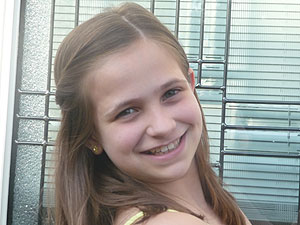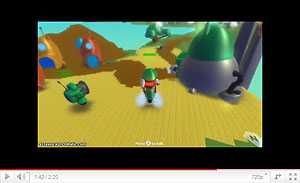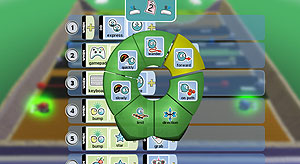REDMOND, Wash. – June 13, 2011 – The only inkling 10-year-old Hannah Wyman had about computer programming was after watching her college-age brother do his homework.

Hannah Wyman, 10, won a grand prize for her video game in the first-ever U.S. Kodu Cup.
“He was programming tic-tac-toe, and for something as simple as tic-tac-toe he was up there for hours just trying to make one thing go here, and one thing go there,” Wyman recalled.
Still, she was intrigued. When her teacher invited her to compete in Microsoft’s first-ever U.S. Kodu Cup – a competition for children and teens to create video games using Kodu, a new visual programming language – the Massachusetts girl said, “Yes, definitely.”
Microsoft today announced the winners of Kodu Cup, including Wyman, who won grand prize in her age group (9-12). The competition also has been held in Malaysia and Australia, but made its debut this year in the United States. Scores of children and teens used Kodu to create video games for the competition. It was an impressive field of entries, said Brad Gibson, senior program manager of Microsoft Research’s Future Social Experiences (FUSE) Labs. FUSE Labs developed Kodu, the kid-friendly programming language for creating games.
“These kids, frankly, did things in Kodu that I hadn’t thought of before. Kids had zombies and fantasy worlds, monsters and infectious diseases, mythical heroes – there was just this incredible variety,” Gibson said. “On one hand you say, ‘Hey, they’re kids, you expect a lot of imagination.’ But when you see the depth of gameplay and the richness of the stories they created, I think many of these kids could be on their way to being world-class game designers.”
Wyman, one of four overall winners, created a game called Toxic in which players collect coins and hearts and solve puzzles to help save the environment.

One Kodu Cup winner, 15-year-old Jacen Sherman, created a Tron-inspired game called “The Vortex” where players must defeat a virus, Vira X, to save humanity and the embattled planet.
“My game is about how the environment is getting polluted, and we need to help shut the factories down and cause less pollution,” Wyman said. “Making it was very fun, and challenging. Just to program an apple to fall out of a tree, it took me quite some time to figure it out at first. But I like (Kodu) and I kind of want to make more games on it.”
Both her game and its message impressed the judges, Gibson said.
“In Toxic, we loved the idea that your character will ‘save the world’ by bumping soot off trees to help them breathe better, by cleaning the air, and by convincing friends to also plant more trees,” Gibson said. “We thought the overall game was very well put together, especially considering the age of the programmer.”
Gibson said Wyman’s story is exactly the reason Kodu was invented — to encourage young people (including some as young as 5 years old) to become interested in science and technology and to perhaps even pursue those fields in college.
The number of students studying college-level computer science in the U.S. declined 63 percent from 2000-2004, and the number of women studying in the field, already well below 50 percent, is also on the decline, Gibson said.
“If you’re tech-savvy, it makes you more competitive and gives you advantages in your work place. What we’re trying to do is find ways to make kids more tech savvy. That’s kind of the foundation for Kodu,” Gibson said. “It’s been a wonderful and exciting to see what’s happened since Kodu was released. We’ve had over 100,000 downloads in about 15 months and we’re working with schools around the country and around the world to install Kodu.”

Kodu, the kid-friendly programming language for creating video games, was developed by Microsoft Research’s Future Social Experiences (FUSE) Labs and has been downloaded more than 100,000 times since it was introduced 15 months ago.
Gibson said even if schools don’t have computer programming classes, Kodu is free to download and easy enough to use that students can still be practicing basic programming and problem-solving skills through the game.
Jacen Sherman, 15, knows he’s lucky to attend a school that offers a computer programming class. The Silver Spring, Maryland, teen won first prize for his game Vortex. Inspired by his design technology solutions class and encouraged by his teacher, Sherman said he has “mixed thoughts” about his future – he’s considering both a career in technology education, and one in robotics (because he likes the programming language Java).
His game opens on a world under nuclear attack and, while humanity has found a way to “upload” itself to a virtual world and launch into space to avoid extinction, one of the creators of this virtual world wasn’t able to make it into the virtual world on time. Out of anger, she unleashed a virus – Vira X – which the player must defeat. Sherman was inspired both by the programming experience, and by the movie Tron.
“Originally I wanted to compete in the Imagine Cup, but I’m not old enough yet, so I wanted to get my feet wet and see what it was like to create a full-fledged game,” Sherman said. “I started playing around and found that Kodu is pretty cool to program in, and it’s a really nice language, so I decided to make a game for it.”
Gibson said from the beginning, Vortex’s innovative 3-D menu system “let us know we were in for a treat.”
“Vortex is beautiful to look at, and the story line was also very compelling, with the spirit of ancient legendary heroes giving you their powers to help you defeat the evil Vira X, saving the villages and people of your world,” Gibson said.
David Gardiner, 9, draws comics about aliens. When his teacher urged him to compete in the Kodu Cup, he decided he’d make a video game about them too.
His game, Gibson said, is both “delightfully whimsical” and jarring. “You can’t sit around and look at the scenery in Alien Attack — with blips and missiles incoming from almost the moment you start the game, you have to keep moving to survive.”
Gardiner said finding out he’d won first place for Alien Attack was “unbelievable.”
“It was the entire United States that was competing,” he said. “When I found out I just won I couldn’t believe it at all. It was really exciting and we had a big barbecue to celebrate it.”
Gardiner tested his game on his younger sister and brother, ages 5 and 7, and plans to continue using Kodu to make “mini games” for them. He also wants to compete again next year.
“I think people should know that it’s a very fun way to experience how to make a video game. It’s not that easy to make a video game, it takes a very long process. It can teach them the different ideas that can go into a game,” Gardiner said. “I’d like to thank my family, my computer teacher, my principal and everybody that helped me. Without them it wouldn’t have been possible.”
Hannah Wyman was similarly thrilled, and as a grand prize winner also received a trip to New York City for the Microsoft Imagine Cup. She’s never been.
“I don’t really know what it’s like, but I know it’s going to be a lot of fun. It’s very exciting,” Wyman said.





